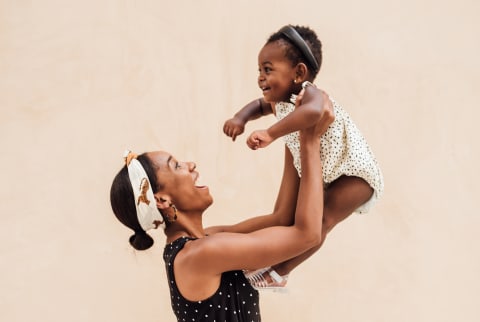Advertisement
These 5 Simple Practices Are Crucial For Building Babies' Brains During Early Development

Gail Gross, Ph.D., Ed.D., M.Ed., a member of the American Psychological Association (APA) and an APA member of Division 39, is a nationally recognized family, child development, and human behavior expert, author, and educator. Her positive and integrative approach to difficult issues helps families navigate today’s complex problems.

In life, there are those singular moments that change you forever. Even as you're experiencing them, you recognize their importance. Seeing your baby for the first time, having her placed into your arms, is one of those moments. The greatest mystery of all is that we live and reproduce, and that we love this new little stranger completely. This is nature's way of assuring the survival of our species. And we are immediately caught in the split between fear and overwhelming love. Fear, because baby doesn't come with any instructions, and suddenly you recognize the overpowering responsibility of being a parent; and love, because nature has conspired to demand your self-sacrifice, commitment, responsibility, and obligation to assure baby's well-being.
Soon you will learn all about your baby. You will recognize the difference between cries of exhaustion, frustration, anger, or hunger. You will be able to distinguish between a reflex smile, a genuine smile, or a grin that indicates trouble ahead. Right from the beginning, baby responds to your reactions. In the earliest days of your baby's life, you become a master of the essentials that assure the survival of your baby. As much as you are learning about your baby, consider that the developing brain of your baby is learning a thousand times more about you. Thus, the most important voice baby ever hears, and the most important face she ever sees, from birth through childhood, is yours.
Every song you sing, every cuddle you give, every game of peekaboo, and every giggle are all creating the scaffolding for your baby's future endeavors. For example, a talent for art and music or a gift for sports or social skills is tracked by these neural pathways initiated through the interaction of you and your baby. Bonding between you and your child is the most central ingredient to the success of this process. Your child needs not only your loving presence but also your time and attention. Today, new technology such as the PET scan (positron emission tomography) and the MRI give us a window into your baby's brain so that you can see with your own eyes the way it reacts to specific outside stimulation.
Your baby is a regular little Pac-Man, finding interest everywhere, including sounds, voices, lights, shadows, colors, mobiles, and experiences of all kinds. By responding to your baby's sense of excitement and wonder, you support a feeling of well-being as he observes that you are validating his explorations. Paying attention and actively listening to your baby fosters his sense of well-being and value. Ultimately, your baby’s behavior becomes focused, as he deliberately elicits your positive responses. Your reactions are everything to him, as you are his world, and he defines himself through his interactions with you. In a sense, this collaboration with your baby will either turn on or turn off his particular genetic dispositions. Consequently, what makes your baby unique are these very experiences crafted by you.
Neuroscience has given us hard data to reinforce the importance of early childhood experiences. The data strongly indicate that children deprived of the nurturing that stimulates brain maturation have important areas of the brain that are profoundly undeveloped. We find this situation not only in orphanages in foreign countries, where babies are left untouched for hours but also in homes where mothers are working long hours, resenting childcare, experiencing postpartum depression, or other emotional or physical problems that make it impossible to connect or bond with their babies. Such a lack of nurturing and care can lead to long-term health problems for baby, including post-traumatic stress disorder and failure to thrive.
5 ways to bond with your baby.
She's finally here: your brand-new bundle of joy. Cradling her in your arms, you gaze at your new baby and feel...nothing. You are not overwhelmed with joy or happiness, and you are not overcome with love and sweet emotions as you imagined you would be, and as you have been told you should be. You wonder: I've been so excited about this baby, and now that she's here, I don't feel any bond at all. What's wrong with me?
First, know that you are not alone and that these feelings are shared by others. There are many possible reasons you feel unable to bond with your new baby, and just because you feel this way today does not mean it will be this way forever.
Bonding between mother and child from the early days of infancy can help build trust and security. Here are five simple ways mothers can create strong bonds with their babies:
1. Spend as much time after your child is born allowing for skin-to-skin contact.
Studies show that this contact helps you release endorphins, resulting in projecting calm and reassurance to your baby. Soon your baby will recognize your touch, scent, and feel compared to others.
2. Talk and sing to your baby.
Allow him to hear the sound of your voice as much as possible from the very beginning, whether singing lullabies or simply explaining how you are changing baby's clothes. Newborns can recognize their mother's voice from the time they are born.
3. Make eye contact with your baby.
Although eyesight is still developing, newborns can see approximately 12 inches in front of them, so when you are holding your baby, be sure to also hold her gaze. Your child will begin to recognize your features and be soothed by your familiarity.
4. Make sure you and your partner are the main people who feed your baby.
Breastfeeding can help build strong bonds between mother and child, but bottle feeding can also strengthen the bond between you and your baby, as well as your baby's bond with your partner. When feeding your baby, hold him close, make eye contact, sing or speak softly, and give all of your attention to your newborn so that he feels calm and soothed during the feeding.
5. Respond to your baby's needs.
You cannot spoil a baby. In fact, the more you bond with your baby now, the more she will learn to trust you. If your child feels secure in her attachment to you, she will more likely grow up to be a more independent adult."
Excerpted from How To Build Your Baby's Brain: A Parent's Guide to Using New Gene Science To Raise a Smart, Secure, and Successful Child by Dr. Gail Gross, with permission from Skyhorse Publishing Inc. Copyright 2019 by Gail Gross.
Watch Next
Enjoy some of our favorite clips from classes
Enjoy some of our favorite clips from classes
What Is Meditation?
Mindfulness/Spirituality | Light Watkins
Box Breathing
Mindfulness/Spirituality | Gwen Dittmar
What Breathwork Can Address
Mindfulness/Spirituality | Gwen Dittmar
The 8 Limbs of Yoga - What is Asana?
Yoga | Caley Alyssa
Two Standing Postures to Open Up Tight Hips
Yoga | Caley Alyssa
How Plants Can Optimize Athletic Performance
Nutrition | Rich Roll
What to Eat Before a Workout
Nutrition | Rich Roll
How Ayurveda Helps Us Navigate Modern Life
Nutrition | Sahara Rose
Messages About Love & Relationships
Love & Relationships | Esther Perel
Love Languages
Love & Relationships | Esther Perel
What Is Meditation?
Box Breathing
What Breathwork Can Address
The 8 Limbs of Yoga - What is Asana?
Two Standing Postures to Open Up Tight Hips
How Plants Can Optimize Athletic Performance
What to Eat Before a Workout
How Ayurveda Helps Us Navigate Modern Life
Messages About Love & Relationships
Love Languages
Advertisement

The 4 Pillars That Lead To Long-Lasting Relationships, From A Marriage Counselor
Rachel Glik, Ed.D., LPC

The 4 Pillars That Lead To Long-Lasting Relationships, From A Marriage Counselor
Rachel Glik, Ed.D., LPC









